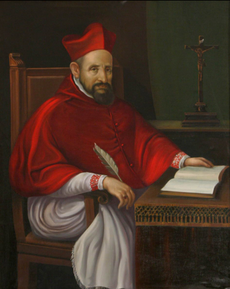Before we get to Bellarmine, for those of you who would like to peruse my take on the strange saga of James Christian Agelles, and what it says about our world, please see my article this morning in Crisis on-line magazine.
(n.b.: An earlier version of this article, which has since been modified, claimed that the ex-boyfriend uploaded an explicit video of his former paramour. That claim has not been substantiated, so should be read in that light. I will modify when I post the article here)
Also, if you readers could kindly offer a prayer for the repose of the soul of my cousin, Thomas Hughes, who was tragically killed in an ATV accident early on Saturday morning. Thomas was one of fraternal triplets, and the family is going through a lot of sorrow. God’s mercy is infinite, et requiescat in pace.
Thomas died on the feast of Saint Robert Bellarmine, one of the shining lights of what is unfortunately known as the ‘Counter-Reformation’, as though the Catholic Church were somehow stifling the noble, reformatory efforts of Calvin and Luther. True enough, the rebellion of the Protestants (and I judge not their motives, which may well have been to some extent good-willed) did lead to much-needed Catholic reforms, culminating in the great Council of Trent, and all the great fruits thereof.
Bellarmine was a noble and generous soul, based on his disciplined and deeply spiritual life, a result of his Jesuit formation (yes, I know, we can hope), which allowed him to see farther than his contemporaries. It was he who warned Galileo in 1616, that if he were going to urge the Church to change her (non-official) interpretation of certain Scripture passages, which seemed to imply a stationary Earth and moving Sun, he had better have solid physical proof.
I say that if there were a true demonstration that the sun is at the center of the world and the earth in the third heaven, and that the sun does not circle the earth but the earth circles the sun, then one would have to proceed with great care in explaining the Scriptures that appear contrary, and say rather that we do not understand them than that what is demonstrated is false.
But as I have written before, Galileo, blinded perhaps by his own hubris, did not ‘proceed with great care’. Rather, he went ahead boldly with his Copernican theory, replete with ‘perfect circular’ orbits, as befit Galileo’s mathematical and Pythagorean obsession. Johannes Kepler, Galileo’s contemporary, was correct, that the orbits were in fact slightly flattened ellipses, and pointed this out to Galileo. Sadly, the stubborn Florentine ignored him, and was having none of non-circular orbits.
Further, the primary ‘proof’ Galileo could offer was that that the tides were caused by the Earth’s motion ‘sloshing’ the oceans around. Nonsense, as the great scientist (who ironically founded the science of motion) should have known. Again, it was Kepler who knew that the tides were in reality caused somehow by the ‘pull’ of the moon, that he thought was magnetic. Again, ignored by Galileo. (It would take Newton to demonstrate gravity, but he would not be born until Galileo’s death in 1642).
If only Bellarmine had lived long enough to help Galileo and the Church see that both were in the right, and both in the wrong, but he died in 1621, before the whole thing blew up . His prudent and discerning mind, formed in the clear and rigorous thought of Saint Thomas Aquinas, could have seen the true middle path, a path that Pope John Paul summarized in his brief address to the Pontifical Academy for Science in 1992. We might then have been spared the tragic, and oft-misunderstood, ‘Galileo affair’, which has done so much harm to the harmony that should (and in reality does) exist between faith and science.
It has been said that Queen Elizabeth the First so feared Bellarmine that she banned all of his writings from Britain. The Protestant revolt under her father Henry VIII, and put into full effect by his royal daughter of his adulterous dalliance with Anne Boleyn, did not much good for merrie olde England, and we are only seeing the full fruits of this schism in the socialist, secularist basket case that Britain, and so many other countries, have become, as they jettison the principles that the Catholic faith of their forefathers offers, without which our society, and our culture, is doomed.
So pray to good Saint Robert, that the new springtime, so often promised, will soon dawn upon the Church, a dawn that will arrive when the Church realizes and puts into effect the full patrimony of her intellectual treasure house, which is the only way her spiritual resources can be put to the most prudent use.










